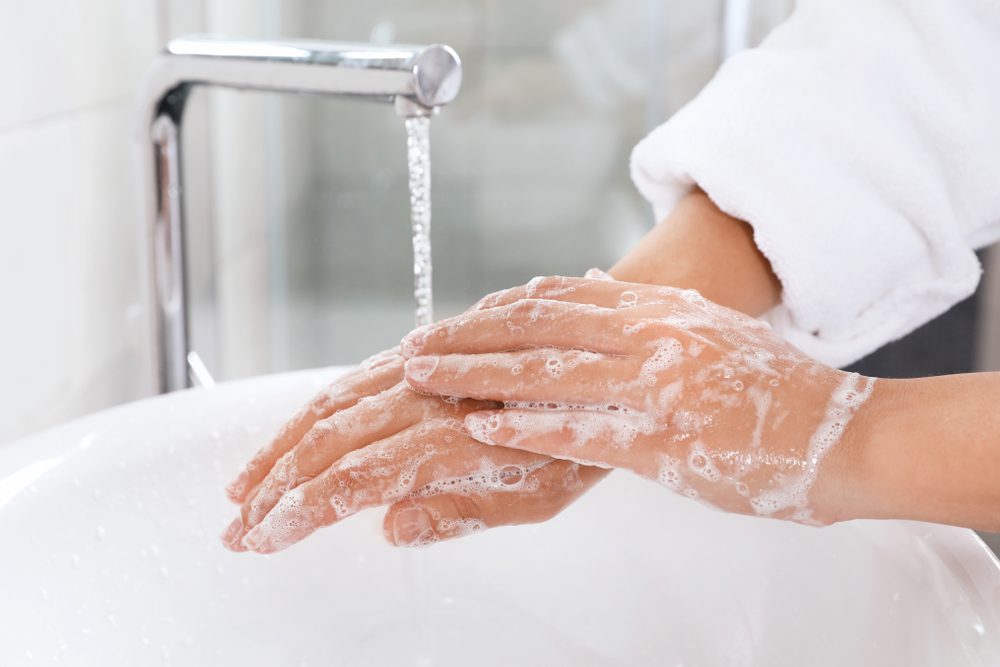Straightforward Instructions for Rectifying Low Water Pressure in Your Home
Straightforward Instructions for Rectifying Low Water Pressure in Your Home
Blog Article
We have uncovered this great article relating to 10 Reasons for Low Water Pressure in Your House directly below on the web and thought it made good sense to quickly share it with you on my blog.

Low water pressure in your house can be a discouraging issue, affecting whatever from bathing to cleaning dishes. If you're experiencing weak water circulation, there are a number of possible reasons and remedies to explore. In this guide, we'll discuss usual factors for low water stress and sensible steps to resolve the problem properly.
Introduction to Low Water Stress
Low water stress takes place when the circulation of water from your faucets, showers, and other fixtures is weak than normal. This can make daily jobs a lot more difficult and less effective. Recognizing the root causes of low water stress is essential to discovering the ideal option.
Typical Sources Of Low Water Pressure
Faulty Stress Regulators
Pressure regulatory authorities are in charge of keeping regular water pressure in your house. If they malfunction, it can lead to low water pressure or uneven flow throughout your house.
Metropolitan Water Issues
Occasionally, the problem lies outside your home. Metropolitan water supply issues, such as main line leakages or upkeep work, can momentarily minimize water pressure in your area.
Pipe Obstructions
Gradually, pipes can end up being obstructed with natural resource, sediment, or particles, restricting the circulation of water. This is an usual concern in older homes with galvanized steel pipelines.
Rust
Rust within pipes can result in leakages and decreased water pressure. Rust buildup can constrict water flow, specifically in aging plumbing systems.
Exactly How to Detect Low Tide Pressure
Evaluating Pipes
Examine noticeable pipelines for signs of leaks, deterioration, or obstructions. Focus on any uncommon noises, such as knocking or rattling pipes, which can suggest issues within the plumbing system.
Consulting with a Plumber
If you're not able to determine the cause of low water pressure, consider working with a specialist plumber to conduct a thorough evaluation. They can determine underlying issues and advise proper solutions.
Examining Faucets and Components
Beginning by checking the water pressure at different taps and components throughout your home. If the issue is isolated to specific areas, it might show local issues.
DIY Solutions to Fix Low Tide Stress
Flushing Water Heater
Debris build-up in the hot water heater can limit flow and lower effectiveness. Purging the container periodically helps remove sediment and keep optimal performance.
Inspecting Pressure Regulator
Guarantee that the stress regulatory authority is working appropriately. Changing or changing the regulatory authority can assist bring back correct water pressure throughout your home.
Cleansing Aerators and Showerheads
Mineral deposits can collect in aerators and showerheads, decreasing water flow. Get rid of and clean these components routinely to boost water pressure.
Cleaning Clogs in Pipes
For small clogs, attempt utilizing a plumbing serpent or chemical drainpipe cleaner to clear blockages in pipes. Beware when using chemicals and adhere to safety and security standards.
When to Call an Expert Plumber
If do it yourself initiatives fall short to solve the concern or if you presume significant plumbing issues, it's ideal to seek aid from a certified plumber. They have the knowledge and tools to resolve complicated concerns securely and effectively.
Preventive Measures to Keep Water Pressure
Installing a Stress Booster
Think about mounting a stress booster pump to boost water stress in areas with continually reduced flow. This can be especially advantageous for multi-story homes or properties with high-demand components.
Monitoring Water Usage
Be mindful of water use routines and stay clear of ill-using the plumbing system. Straightforward modifications, such as staggering showers and laundry lots, can help maintain adequate water pressure.
Normal Upkeep
Set up regular upkeep for your plumbing system to avoid problems such as deterioration, leakages, and obstructions. Resolving small problems early can help avoid even more substantial fixings in the future.
Final thought
Taking care of low tide stress can be irritating, but recognizing the underlying reasons and implementing appropriate remedies can recover optimal flow throughout your home. Whether it's cleansing aerators, checking pipelines, or talking to a plumber, taking positive actions can ensure a stable supply of water for your day-to-day requirements.
HOW TO FIX LOW WATER PRESSURE IN YOUR HOUSE
When your plumbing system functions properly, you likely never think about the water pressure coming from your faucets, shower heads, or other water fixtures. If you experience low water pressure in your house, though, it can quickly cause problems for cooking, cleaning, bathing, and laundry. Learning how to fix low water pressure in your house can help you avoid frustrating situations and worsening plumbing issues.
When investigating why your home has low water pressure, call the plumbing professionals at Hutchinson to inspect your system, identify the problem, and perform necessary repairs. Our highly-trained plumbing system experts utilize the best tools and techniques available to resolve issues with your home’s plumbing system. Call today to schedule a service with our experts and resolve the low water pressure in your home.
Common Causes of Low Water Pressure
While learning about how to fix low water pressure in your house, it’s essential to understand the various causes of this issue. From plumbing system failures to issues with your water fixtures, there are many reasons for low water pressure in a home. The most common causes of low water pressure include:
Pipe corrosion: If you live in an old house, your pipes could be much older than you realize. Over time, most pipes corrode, especially those made from galvanized steel. Corrosion creates small holes in your pipes that allow water to leak as it travels to your fixtures, leading to low water pressure. Hard water: Hard water forms when water retains a certain concentration of mineral and sediment buildup. Hard water can exacerbate corrosion and reduce water pressure. Hard water remains one of the main culprits of clogged pipes. Clogged pipes: When a pipe blockage clogs your system, it restricts water flow. That’s why clogged pipes are a leading cause of low water pressure. Faulty fixtures: Components within individual water fixtures can experience isolated clogging and rusting that cause low water pressure. If you notice only low shower pressure or limited faucet flow, inspect your system for faulty fixtures displaying rusting, clogging, and other damage. Water line leaks: Your water supply usually comes from a community source connected to your home through a water line. Any leaking in this water line will reduce water pressure before it enters your home. If you share a water line with neighbors, they might also notice low water pressure due to this problem. Broken pressure regulator: The pressure regulator ensures the water flowing throughout your home remains at a psi of about 50. Damage or breakdown of this crucial component will reduce water pressure throughout your property. Closed valve: The water valve supplying your home must be fully open to enable proper water pressure. A partially closed valve will yield low water pressure and cause issues. 5 Ways to Fix Low Water Pressure
Check for Leaks
Depending on their severity, leaks are usually easy to identify as the cause of your low water pressure. Whether your basement floods overnight or you notice mold growth on surfaces near your pipes, leaks usually present noticeable symptoms. In most cases, you’ll need to call professionals to replace sections of damaged piping or seal water line leaks.
Clear Clogged Pipes and Drains
Clogs can occur in any part of your system at any time. In most cases, it’s difficult to resolve clogged pipes and drains without professional equipment and experience.
Hutchinson experts can perform a comprehensive plumbing system inspection to identify the clog’s source and remove obstructions from your pipes. With the help of advanced equipment, we can restore your home’s normal water flow and pressure.
Replace the Pressure Regulator
After identifying a faulty pressure regulator as the cause of your low water pressure, there’s nothing to do but replace the mechanism. Homeowners should never conduct their own replacement.
Attempting to replace a crucial component like your pressure regulator that attaches to your overall plumbing framework could cause unnecessary damage and worsen the situation. Instead, rely on professionals to replace your pressure regulator properly.
Repair or Replace Broken Faucets and Fixtures
If you notice water pressure issues in an individual faucet or fixture, you can solve the problem quickly. Depending on the type and location of the fixture, you can likely replace it yourself.
For homes with custom fixtures, you might need to special order new parts. In these cases, opting for professional replacements helps you avoid any mishaps that could leave your water feature dysfunctional for longer.
Install a Pressure Booster
Water pressure problems impacting your neighborhood or community at large might require more overarching solutions. If your neighbors experience low water pressure as well, you might need to integrate a pressure booster into your water supply line.
Pressure boosters upgrade the water pressure starting at the source. These mechanisms can provide water pressure benefits to any homes on the same supply line. Call Hutchinson today to install a pressure booster on your water supply line.
Call Hutchinson to Fix All Your Plumbing Issues
Low water pressure is just one of many plumbing problems that reduce home comfort and cause system issues. The top-rated professionals at Hutchinson offer comprehensive plumbing services, including system inspections, maintenance, and repairs.
https://www.hutchbiz.com/blog/2024/01/15/how-to-fix-low-water-pressure-in-house/

I came across that review about Dealing with Low Water Pressure in Your Home when exploring the internet. If you appreciated our article plz be sure to share it. Thanks a lot for being here. Kindly visit our blog back soon.
Details Report this page